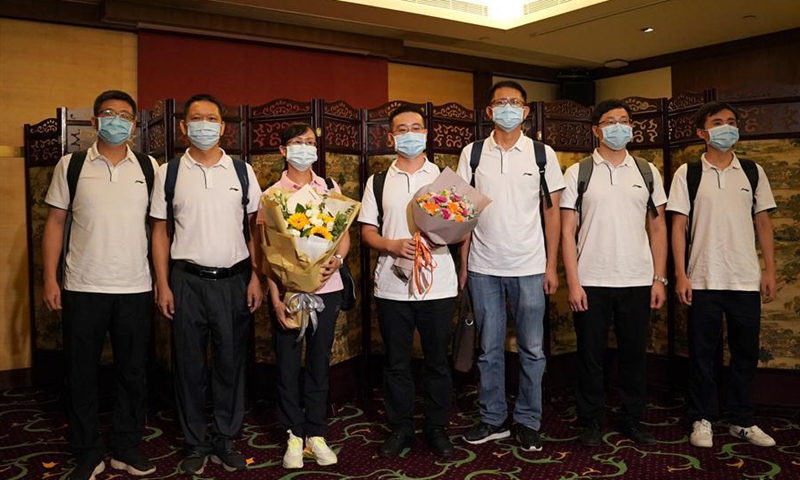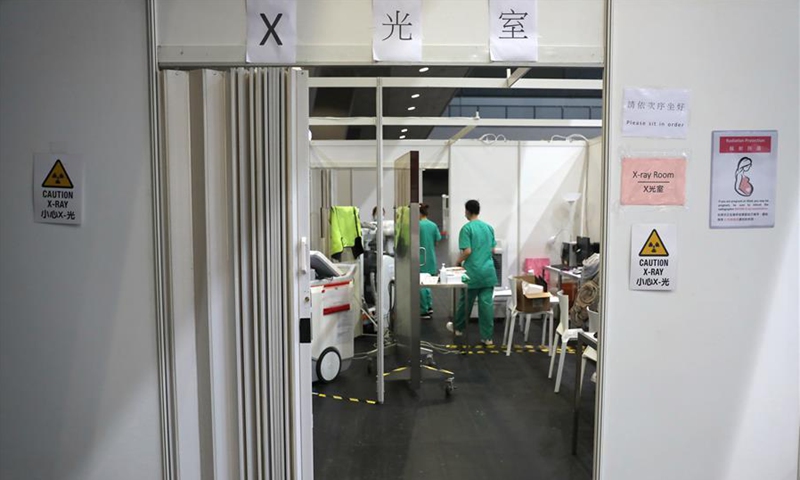Medical aid team arrives in HK, bringing skills, blessing
By Liu Caiyu, Fan Anqi and Cao Siqi Source: Global Times Published: 2020/8/2 21:38:40
More urgent to cut off community transmission by expanding tests: expert

Virus testing professionals from the Chinese mainland pose for a group photo after their arrival in Hong Kong, south China, on Sunday. Seven virus testing professionals from the Chinese mainland arrived in Hong Kong on Sunday afternoon as the first batch of mainland supportive teams to help contain a worsening spread of COVID-19 in Hong Kong. Photo: Xinhua
After the seven clinical laboratory technicians from the neighboring Guangdong Province arrived, they will meet with officials and staff from the Hong Kong Special Administrative Region (HKSAR) health department and BGI Genomics before they get to work in laboratories.
Locals and experts in Hong Kong reached by the Global Times on Sunday applauded the aid from the central government as being "timely," as Hong Kong has confirmed more than 100 new cases of COVID-19 for 12 consecutive days. The medical system is stretched to its limits with 115 confirmed local transmissions reported on Sunday, bringing the total confirmed COVID-19 infections to 3,511.
The team of seven is led by Yu Dewen, an expert from the health commission of Guangdong Province and who was commander in chief of the Guangdong medical team which helped Wuhan in the early days of the epidemic. Guangdong will later dispatch 60 clinical laboratory technicians selected from more than 20 local public hospitals to Hong Kong.
As part of efforts by the National Health Commission (NHC), a team of six from the Chinese mainland with expertise in constructing Wuhan's makeshift hospitals will be dispatched to Hong Kong as well, staying there for six months at most to help the city build makeshift hospitals, local media the Changjiang Daily reported.
Hong Kong's Chief Secretary for Administration Matthew Cheung Kin-chung said Sunday that apart from assisting Hong Kong to build the makeshift hospital at the AsiaWorld Expo, the central government will also help build a new specialist modular hospital in Hong Kong, similar to Huoshenshan Hospital that was built in Wuhan in just 10 days.
Cheung said the HKSAR government is seeking the suitable location to build this hospital, but how many people from the Chinese mainland will get involved is unknown.
Aid teams from the Chinese mainland are expected to bring the most "effective" anti-epidemic measures to Hong Kong as the city has adopted relatively loose measures to keep the numbers of infections low, rather than clearing infections entirely, Wang Peiyu, a deputy head of Peking University's School of Public Health, told the Global Times on Sunday. "The team will help Hong Kong to cut community transmission of the virus by expanding COVID-19 testing."

Photo taken on Aug. 1, 2020 shows the X-ray room of a makeshift hospital for COVID-19 patients at the AsiaWorld-Expo in south China's Hong Kong. A makeshift hospital at the AsiaWorld-Expo, a venue near the Hong Kong International Airport, began receiving COVID-19 patients with mild symptoms since Saturday afternoon, Hong Kong's Hospital Authority (HA) said. (Xinhua/Wu Xiaochu)
Go on a mission
Aid teams from the mainland are not only responsible for bringing the mainland's epidemic preventive and control measures to Hong Kong, they would also bring blessings from the mainland.
Asked how a citywide nucleic acid testing program covering about 7.5 million Hong Kong residents should be carried out, Jin Dongyan, a biomedical professor at the University of Hong Kong, told the Global Times on Sunday that "As Hong Kong has large population flows and less ability to mobilize people at the community level than the mainland, it will be harder to arrange citywide testing for all residents there."
Wang noted that conducting citywide tests is not as urgent as cutting community transmission. When there is a confirmed patient, both close contacts and people living in the same zone, either in same community or company, should be tested. The method of expanding tests has proved effective in mainland cities, Wang said.
Among the team of six who will help with the makeshift hospitals, the NHC selected those with most experience who had fought in Wuhan where COVID-19 was first reported, including Wan Jun, head of Wuchang makeshift hospital in Wuhan. Others in the team include experts in infectious disease prevention and control and nursing services as well as two specializing in construction design.
The team will not only bring experience of building a makeshift hospital, but also bring the best wishes the mainland has for Hong Kong, Wan said.
Wan's team will share their experience of how to operate a makeshift hospital with their peers in Hong Kong, including design, personnel arrangement, treatment processes, training and the disposal of medical waste.
Before their departure, the team has been studying medical standards and regulations in Hong Kong. They are likely to head for Hong Kong Monday or Tuesday, the Global Times learnt from sources.
Offering 500 beds, the renovated AsiaWorld Expo hospitals opened to COVID-19 patients on Saturday, which is helping reduce the pressure that regular hospitals are under.
Jin said that building a new hospital along the lines of Huoshenshan might not happen at once, as it will take time to find the right place that is less populous, but it would help Hong Kong deal with an unexpected larger COVID-19 outbreak in the future.
As aid teams from the mainland are embarking on their mission to Hong Kong, some went to the AsiaWorld Expo holding banners on which was written "thanks for my country, thanks for the national medical team." Some from the mainland sent blessings online, hoping that Hong Kong will win the battle against the novel coronavirus as soon as possible.
The medical workers from the Chinese mainland have offered great help in times of need, Hong Kong Financial Secretary Paul Chan Mo-po also expressed thanks to Beijing on Sunday for extending a helping hand to Hong Kong.
However, medical aid from the mainland was also put under political lens as some people in the city were seen to mock, even oppose such help.
A group of people from the Neo Democrats launched a protest in front of the Hospital Authority of Hong Kong, expressing their discontent for the mainland's help.
Roy Tam Hoi Pong, a member of the organization and also a Tsuen Wan district councilor, claimed that the public and private hospitals and clinics in Hong Kong have sufficient resources to conduct tests for all high risk groups.
"Opposing support teams from the mainland is just like those protesters who targeted the city's smart lampposts as they feared the government was using them to spy on them. Such protest is a typical reflection of anti-intellectualism," Nixie Lam, a Tsuen Wan district councilor, told the Global Times on Sunday. Lam slammed the organization for being stupid and shallow and putting politics ahead of human lives.
Victor Chan Chi-ho, vice chairman of the Hong Kong Association of Young Commentators, also told the Global Times on Sunday that it is shameful for some opposition people with ulterior motives criticizing the kind offering from the central government, even increasing the chaos as the city is experiencing the severe outbreak.
According to Lam, people who oppose the mainland's support have always harbored hatred toward the mainland. Previously, their political advocacy mainly focused on inciting local residents to push people away from the mainland by claiming that travelers from the mainland were taking the resources of local residents.
But such voices are a just a small minority, and it cannot represent the majority of residents in the city, Lam stressed.
Posted in: SOCIETY,HK/MACAO/TAIWAN